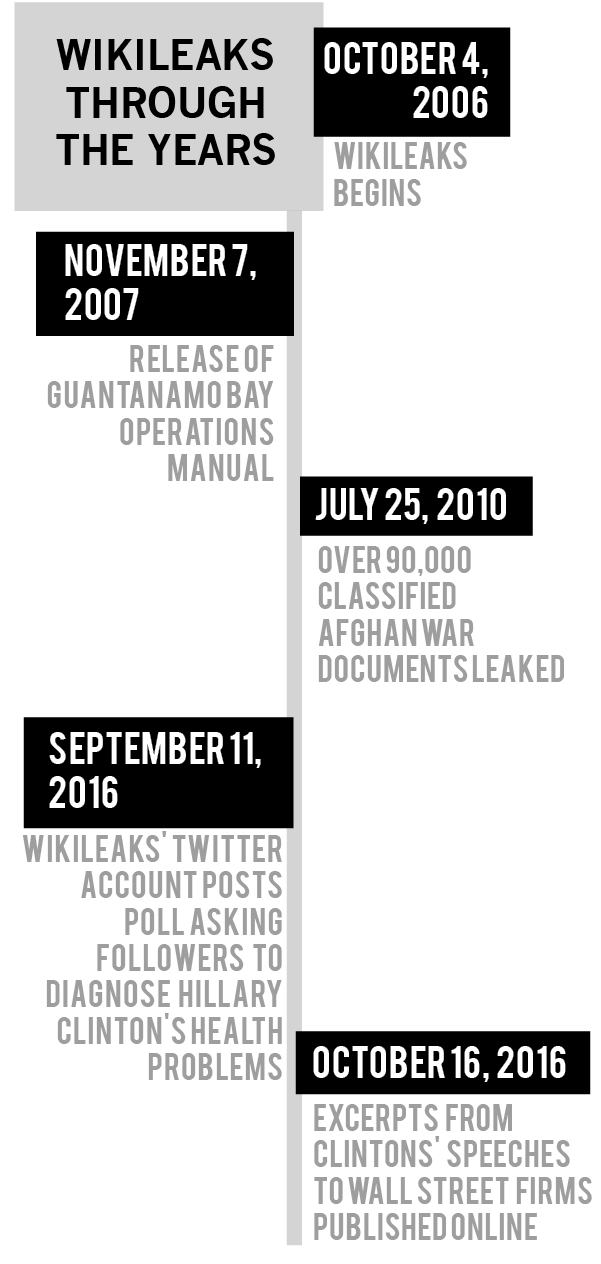By Failing to Deliver Full Context and Endangering Innocent People, WikiLeaks Fails to be Trustworthy Whistleblower
The release of highly classified documents that endanger U.S civilians’ and soldiers’ lives overseas should never occur. In an NPR interview, former CIA field officer Robert Baer and Director of the National Security Archives Tom Blanton agreed that while the U.S. government should be more transparent with the public about its activities, the government has the right and the imperative to keep secret things that could jeopardize national security. In 2010, WikiLeaks released hundreds of thousands of cables from the U.S. State Department. Within the documents released were the names of Afghans who provided intelligence to the U.S. during the war in Afghanistan, as well as a road map to the American’s tactical procedures within the region. Not only did the release of information make U.S. soldiers and their operations vulnerable to attack, it made these Afghani informants face immense retaliation by the Taliban. The number of deaths and injuries resulting from this release is still unknown.
Recently, WikiLeaks has been feeding the conspiracy surrounding Democratic presidential candidate, Hillary Clinton’s health. After a fall in early September, WikiLeaks posted and then deleted a poll on Twitter asking its followers to speculate the cause of Clinton’s fall. The poll speculated that the former secretary of state had Parkinson’s disease or multiple sclerosis. Clinton later revealed that she was only dealing with a minor case of pneumonia.
The problem with WikiLeaks is that its release of information causes many viewers to take information out of context, which then spreads across social media. Besides spreading dangerous information that puts the lives of Americans both here and abroad at risk, WikiLeaks produces information that is downright false. Assange’s personal vendetta against U.S. government officials (including Clinton) and quest to engage in petty politics does not make the site the noble whistleblowing source it claims to be. It makes it shoddy journalism.
— MEGAN MONGES Senior Staff Writer
Despite Collateral Damage, WikiLeaks Challenges Governmental Secrecy with Necessary Transparency
WikiLeaks isn’t perfect, and at times, its mistakes have resulted in adverse and even fatal consequences. However, what it has done to force governmental transparency in the U.S. is a priceless gain for a stumbling democracy.
Some of the most revealing information from WikiLeaks came in 2007 when the outlet gave the public access to the U.S. Army’s “Standard Operating Procedures for Camp Delta,” i.e. its manual for treating, or mistreating, Guantanamo Bay prisoners. The guidelines, all of which are completely official, stated that an inmate could be denied access to Red Cross for up to four weeks. Furthermore, prisoners could earn “special rewards” for good behavior or cooperation, one of which was a roll of toilet paper. Though some argue this merely stated what we already knew, anyone accused of conspiracy theorizing knows that having access to clear-cut evidence makes all the difference.
A less damning, but still politically telling, information leak recently involved the release of emails sent and received by John Podesta, the chairman of Hillary Clinton’s 2016 presidential campaign. Among them were excerpts from the candidate’s paid speeches to Wall Street firms, one of which had Clinton stating, “you need both a public and a private position.” In response, Clinton’s campaign spokesman Glen Caplin said, “WikiLeaks is proving [it is] nothing but a propaganda arm of the Kremlin with a political agenda doing [Vladimir] Putin’s dirty work to help elect Donald Trump.” Such a hyperbolic condemnation indicates how much our government considers WikiLeaks an enemy to its status quo of secrecy, an exclusionary system that prevents citizens from really knowing the officials they elect.
Though a denouncement from the government — the natural enemy of transparency — is unsurprising, any outside supporter of democracy should be behind the mission of WikiLeaks. Indeed, we should continue to criticize and hold it accountable for releasing damaging information, such as the Afghan War Diary, but its presence serves as a necessary counterforce to what is otherwise an extremely private government.
— JACKY TO Staff Writer











